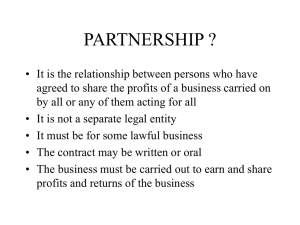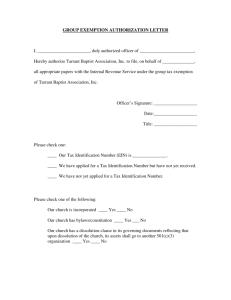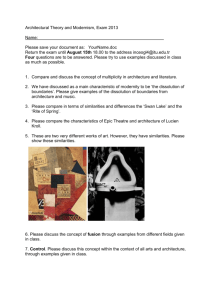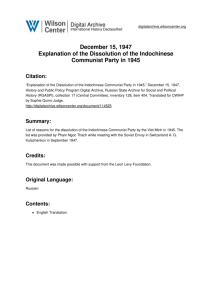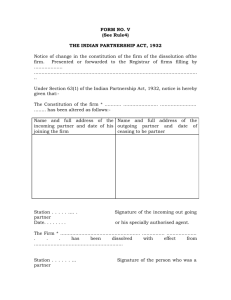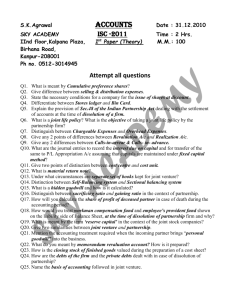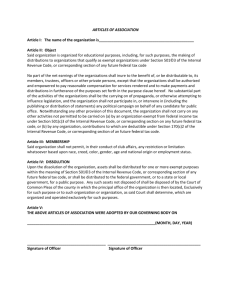Business_Law_Chp_06
advertisement
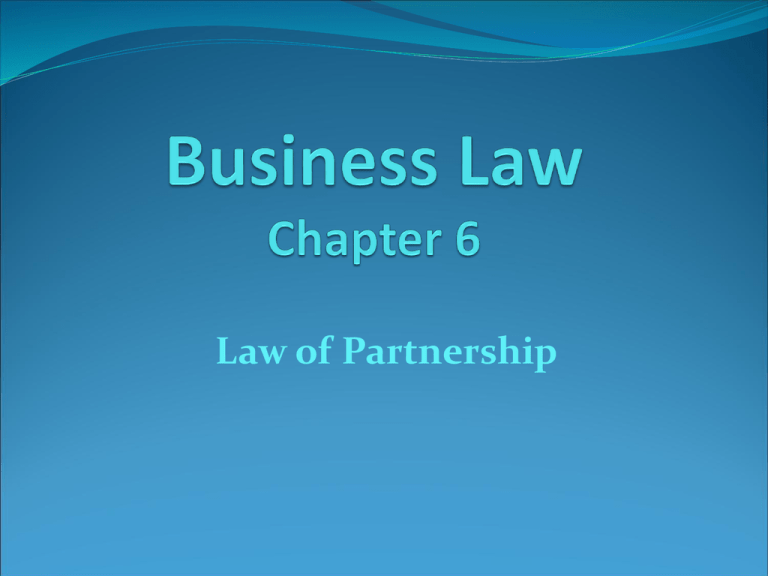
Law of Partnership Meaning and Definition According to Partnership act, 1932 (sec. 3). A partnership is a voluntary association of two or more persons, who contribute money, property, time and skill to carry on business for profit and to share the losses of the business. USA Partnership law “Act 1907” define Partnership as: “ An association of two or more persons who carry on as coowners, a business for profits.” Prof. Haney: “Partnership is the relation existing between persons to make contracts who agree to carry on a lawful business with view to earn profit.” Characteristics The following are the characteristics of partnership: 1. Legal Entity A partnership has no separate legal entity apart from its members. The rights and liabilities of the firm are considered the rights and liabilities of the partners. If any of the partners dies, retires or become insane, the partnership agreement comes to an end. 2. Agreement A partnership is the result of an agreement between persons. An agreement may be written or oral. Only the persons who are competent to the contract can form a partnership. Cont.. 3. Number of Partners There must be at least 2 persons to form a partnership. The partnership act section 14 mentioned that there should be not more than 20 partners in partnership. 4. Sharing of Profit and loss The agreement between the partners must be to share the profit and loss of a business. The profit and loss will be distributed among the partners according to their investment. 5. Capital Generally, the capital of the firm is supplied by all the partners. Capital is contributing according to the agreement. A person without contributing any capital may become a partner on the basis of his ability, education and experience. Test of Partnership In order to determine the existence of partnership, the following must be proved: 1. There must be an agreement among the parson to be held as partners. 2. The agreement must be to share the profit and loss of business. 3. There must be an agreement to carry on the business by all or any of them acting for all. 4. The agreement must be for doing some legal business. Cont… Partner Person who have entered into partnership with one another are called individually partners. Generally, the word partner means a person who has agreed to share the profit and loss of the business. Firm The persons who have entered into a partnership with one another are collectively called a firm. Firm’s name The name under which partners carry on their business is called the firm’s name. The partner can choose any name for the firm according to section 58, which says the name of firm must not be identical or similar to the name of an existing firm. Kinds of Partners The following are kinds of partners according to liability, participation in management and profit etc. 1. Active Partner A partner who takes an active part in the management of firm is called active partner. He takes interest in the affairs of the firm. Such a partner must give public notice of his retirement from the firm in order to free himself from liability. He is also called working partner. 2. Sleeping partner One who does not take an active part in the management of the firm is called sleeping or dormant (resting) partner. Such partner brings only capital in the business. He is also liable to the creditor of the firm like other partners. He is not required to give notice to general public about his Conti… retirement from the firm because he is not know to the public. 3. Nominal Partner One who lends his name and reputation to the firm is called nominal partner. He does not invest in business. He does not take part in the management like other partners. He does not get share in profits. A nominal partner is well known, well connected individual whose name lends credibility and recognition to the firm, he is paid a fees for this reputation. But, he is regarded as partner in the eye of law. He is liable to the outsiders for the debts of the firm. 4. Senior Partner A partner who has a more investment in the firm and receive more profit is called senior partner. He plays a major role in the management of the business due to experience, capability and other skills. Conti… 5. Junior Partner A junior partner is the opposite of a senior partner. Usually he is a young man who has recently become a partner of the firm. He has a small investment in the business. Due to small investment and less experience, he receive a small share in the profits and loss. He has no major role in decision making. 6. Secret partner He is a partner whose membership is kept secret from outsiders. He takes an active part in management of the firm. He is liable for the debts of the firm like other partners. 7. Minor Partner A minor is a person who has not completed 18 years of age. He is not competent to contract. But with the consent of all partners he may be admitted to the benefits of partnership by an agreement with his guardian. Formation of Partnership There must be an agreement among the partners to form a partnership. The following points must be considered before entering into an agreement of partnership: The partners of a firm should be selected with care. 2. The object of the firm should lawful. 3. The rights and duties of partners must be discussed in detail and in writing. 4. The partnership should be registered. 1. Partnership Deed The partnership agreement in writing is called partnership deed. It is better to have a written agreement. The partnership deed generally contains the following provisions: 1. The name of the firm. 2. The name and address of all partners. 3. The nature of business of the firm. 4. The town and place where the business will be carried on. 5. The amount of capital invested by each partner. 6. The duration of the partnership. 7. The ratio of sharing profits and losses. 8. The amount, a partner can withdraw from the firm. 9. The circumstances under which a firm shall dissolve. 10. The rights, duties and liabilities of partners. 11. The period of accounting year. etc Types of Partnership The following are three types of partnership. 1. Partnership at will Where no provision is made in the agreement regarding the duration of the partnership, it is called partnership at will. Any partner can terminate it any time, by giving a notice of termination. A partnership is called partnership at will under the following cases. a. When a partnership is formed for unlimited period. b. When a partnership firm is formed for limited period and it continues after the expiry of this period. c. When a partnership firm is formed for a particular project and it continues after the completion project. Types conti… 2. Particular Partnership When a partnership is formed to do a particular business or for a particular period, it is called a particular partnership. Such a partnership is dissolved immediately on the completion of the particular business, e.g. producing a film. (sec. 8) 3. Limited Partnership A limited partnership is regulated and controlled by Partnership Act 1907 of England. The following are the features of limited partnership: a. It is formed under Limited Partnership Act 1907 of England Conti… b. Some partners may be with limited liability. c. There is at least one partner with unlimited liability. d. A limited partner can not take active part in the management of the firm. e. The limited partner can inspect the books of the firm any time. f. He can give suggestions and recommendations to other partners. g. A new partner can be admitted to the partnership firm without the consent of the limited partner. h. It cannot have more than 20 partners in the ordinary type of business except banking it has only 10 partners. Dissolution of Firm The dissolution of a partnership is different from dissolution of a firm. When one partner dies, retires or becomes insolvent but the remaining partners continue the business, it is called dissolution of the partnership. When the relationship between all the partners comes to an end and the business is closed, it is called dissolution of firm. It means that the dissolution of the firm includes the dissolution of partnership, but the dissolution of the partnership may or may not include the dissolution of the firm. Grounds of Dissolution of firm A firm may be dissolved on any one of the following grounds: 1. Dissolution by Agreement A firm may be dissolved with the consent of all the partners or in accordance with contract between the partners. The consent of majority is not enough to dissolve a partnership firm. (sec. 40) 2. Compulsory Dissolution compulsory dissolution takes place in the following circumstances. a. When all the partners are declared insolvent. b. When all except one of the partners are declared insolvent. c. When the business of the firm becomes unlawful. (Sec 41) Cont… 3. Contingent (conditional) Dissolution Subject to contract between the partners, a firm is dissolved on the happening of the following events: (sec. 42) a. On the expiry of fixed period for which the firm was formed. b. On the completion of project for which the firm was formed. c. On the death of a partner. d. On the insolvency of any partner. Conti… 4. Dissolution by notice When the partnership is at will, the firm may be dissolved by any partner giving notice in writing form to all the other partners of his attention to dissolve the firm. A notice of dissolution once given cannot be withdrawn without the consent of other partners. The firm is dissolved from the date mentioned in notice. If no date is mentioned, it dissolved from the date of the communication. Conti… 5. Dissolution by Court The court decides about the dissolution of a firm if there is a difference of opinion between the partners regarding the dissolution. For example, when a partner has become insane, some of the partners are willing to continue while others are insisting on the dissolution of firm. The court may dissolve a firm on any decision.

